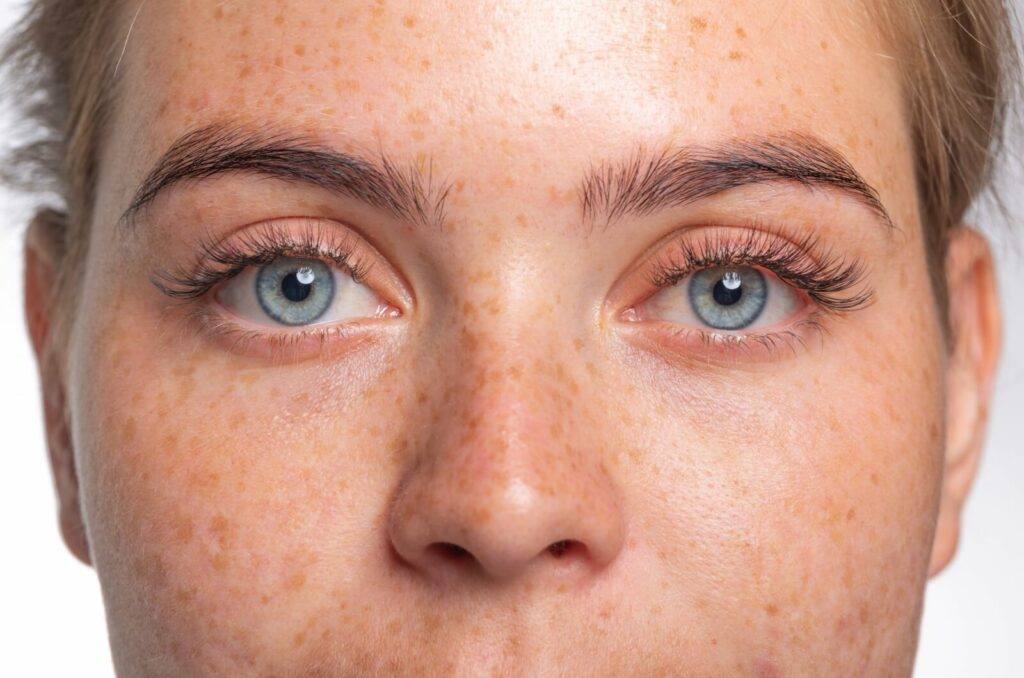Having to squint your eyes or use your hand to shield your eyes from the bright sun is a universal experience, but do some people have it worse than others? There is some evidence that people with blue eyes are more sensitive to sunlight than people with brown eyes. People with blue eyes are more likely to develop certain eye conditions.
Luckily, you can protect your eyes from sun damage regardless of their colour. By consistently wearing sunglasses and hats to shield your eyes from the sun, you reduce your risk of developing eye diseases caused by sun exposure.
The Link Between Eye Colour & Light Sensitivity
The link between eye colour and light sensitivity is similar to the link between skin tone and sunburns/tans. The more pigment your iris (the coloured part of your eye) has, the less sensitive your eyes will be to light.
What Determines Eye Colour?
Eye colour is a fascinating topic rooted in genetics. The colour of our eyes is primarily determined by the pigmentation in the iris and the way light scatters in the stroma. Melanin, the pigment responsible for hair and skin colour, also plays a crucial role here. People with brown eyes have more melanin in their iris, which offers greater protection against the sun’s ultraviolet (UV) rays.
The Role of Melanin in Eye Protection
Melanin acts as a natural barrier against UV radiation. It absorbs and deflects harmful rays, preventing damage to the retina and other parts of the eye. This is why individuals with darker eyes often experience less sensitivity to bright light. In contrast, blue-eyed individuals have less melanin, making them more susceptible to UV exposure.
Are Blue Eyes More Sensitive to Sunlight?
The science suggests that blue eyes can be more sensitive to light. With less melanin to shield them, blue eyes allow more light to enter, which can lead to discomfort in bright conditions. This isn’t to say that those with blue eyes are at constant risk, but rather that they may need to take extra precautions when spending time outdoors.
A great way to protect your eyes is by throwing on a hat with a large brim or your favourite pair of sunglasses before you head outside. This blocks light rays from directly entering your eyes, shielding them from UV radiation.
The Science Behind UV Light & Eye Health
How UV Light Affects the Eyes
UV light is a type of electromagnetic radiation that comes from the sun. While it contributes to the natural beauty of a sunny day, it can be harmful over time. Prolonged exposure to UV rays can lead to several eye issues, including cataracts, macular degeneration, and even eye cancer.
Are Blue Eyes at Greater Risk?
Given their reduced melanin levels, blue eyes allow more UV light to reach the retina. This increased exposure can heighten the risk of developing eye conditions associated with UV damage like eye cancer and macular degeneration. It’s important for blue-eyed individuals to be aware of these risks and to take preventive measures.
The Benefits of Sunglasses for Eye Health

Sunglasses are more than a fashion statement; they are a vital tool in protecting our eyes from harmful UV rays. For blue-eyed individuals, who may be more sensitive to sunlight, sunglasses can provide much-needed relief and protection. They reduce glare, improve visual clarity, and prevent squinting, which can lead to eye strain.
Choosing the Right Pair
When selecting sunglasses, it’s essential to look for lenses that offer 100% UV protection. Polarized lenses can also be beneficial, as they reduce glare from reflective surfaces like water or roads. Ensuring a comfortable fit is crucial, so you’re more likely to wear them consistently.
The Importance of Year-Round Protection
Many people reserve their sunglasses for the summer months, but UV rays can be just as damaging in winter. Snow can reflect up to 80% of UV rays, making sunglasses vital even on cold, sunny days. Blue-eyed individuals, in particular, should make sunglasses a staple all year round.
The Pros of Blue Eyes for Eye Health
While having blue eyes can put you at risk for some eye conditions, it may protect you from others! Having blue eyes lowers your risk of developing cataracts and seasonal affective disorder.
The Importance of Eye Exams
While consistently protecting your eyes from the sun is important, it’s also important to keep up with regular eye exams. The Canadian Association of Optometrists recommends that children have an eye exam every year from 5-18, and adults should schedule an eye exam once every two years.
During a comprehensive eye exam, your optometrist can test your eyes for eye diseases like cancer, cataracts, and macular degeneration. The earlier these conditions are noticed, the easier it is to treat them, so you can get back to your best eye health.
Protect Your Eyes From the Sun
No matter your eye colour, UV light can cause long-term damage to your eyes. That’s why it’s important to protect your eyes from prolonged exposure to the sun by wearing a hat and sunglasses. It’s also important to make sure you schedule regular eye exams, so your optometrist can monitor your eyes for eye diseases caused by sun exposure.
At Total Focus Family Optometry Centre, we offer comprehensive eye exams for children and adults. You can book an appointment with us today to get started on your eye health journey.




